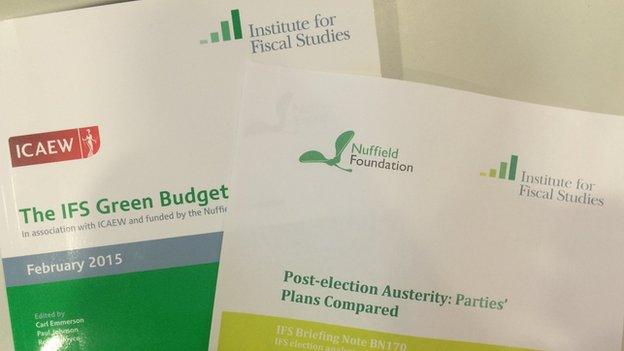Reality Check: Why should we trust the IFS?
- Published

Many politicians like to cite the Institute for Fiscal Studies (IFS) when seeking to legitimise their own claims or rubbish those of their political rivals. But what is the IFS, and why is it seen as such a credible voice?
The IFS describes itself as an "independent research institute", launched in 1969. This not-for-profit organisation researches a range of topics, including public finances, taxation, benefits and education policies.
The IFS says that it operates "on a non-political basis". It does not have political affiliations and appears willing to both endorse and criticise policies from parties across the political spectrum. The IFS' independence is one of the reasons parties like to cite it, as the IFS is not seen as having vested political interests.
The IFS is funded from a range of sources. The largest proportion of the IFS' income comes from the Economic and Social Research Council (ESRC). The IFS also receives funding from the European Union, UK government departments and private corporations.
There are lots of other think tanks and research organisations around, but many of those are seen to have a more tailored political outlook.
The Office for Budget Responsibility (OBR) is an interesting comparison. The OBR was set up by Chancellor George Osborne in 2010 as an independent body that would review the public finances. It is currently chaired by Robert Chote, who used to be director of the IFS.
The OBR has quite a wide remit to analyse the public finances, but its mandate is set down in law and there are some restrictions over what it can do. For example, the OBR can look at the costings of the government's policies. However, it is not allowed to assess policies set out by opposition parties, nor is it able to take a view on the benefits of a given policy.
Labour has called for the OBR to be allowed to analyse opposition policies, but an independent review last year urged caution when considering such expansions in the OBR's mandate.
Not everyone supports the view that the IFS is truly independent. For example, the respected commentator on tax issues Richard Murphy published a critique of the IFS in 2008. Mr Murphy said the IFS had a bias towards a "neoliberal view" on how labour and capital was taxed.
Politicians are also occasionally willing to set out their disagreements with the IFS. In 2010, Deputy Prime Minister Nick Clegg called an IFS review of the coalition's spending plans "distorted and a complete nonsense". Today, the Labour Party endorsed some of the IFS' analysis but said the think tank had made a wrong assumption about the party's fiscal plans.
So while political parties are willing to use the IFS to support their arguments, they won't always accept the organisation's findings.
However, the IFS has managed to maintain a generally solid reputation for impartiality among commentators of different political colours.

Election 2015 - Reality Check

What's the truth behind the politicians' claims on the campaign trail? Our experts investigate the facts, and wider stories, behind the soundbites.
Read latest updates or follow us on Twitter @BBCRealityCheck, external
